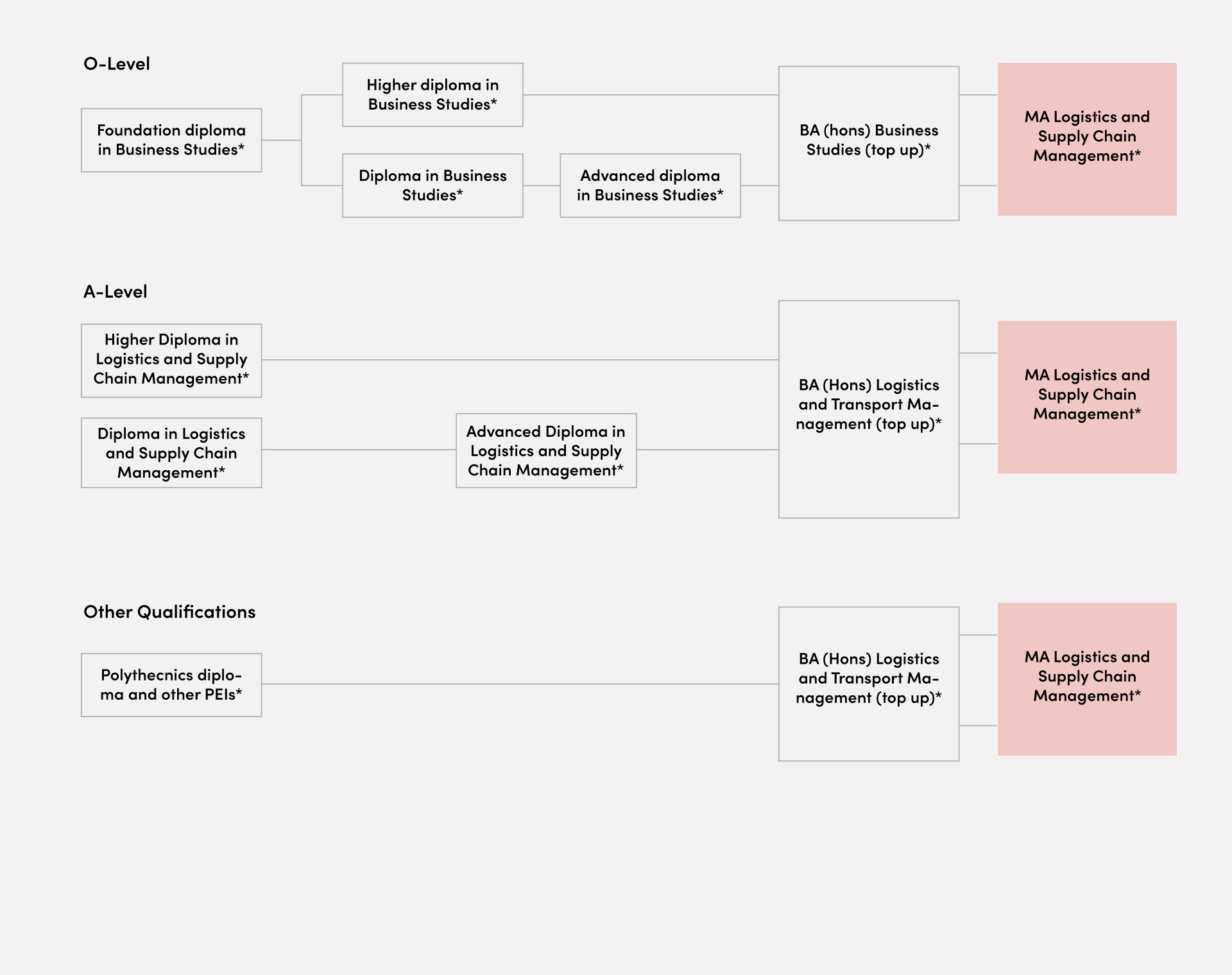
OVERVIEW
About This Programme

The Master of Arts in Logistics and Supply Chain Management equips students with the skills and knowledge to excel in global supply chain and logistics management. The programme combines theoretical foundations with practical applications, focusing on strategic decision-making, operational efficiency, and technological advancements. Upon completion, the MA degree will be awarded by the University of Greenwich.
Ranked Top 7% Globally
by Center for World University Rankings
12 month | full-time
18 month | part-time
fast track degree
Research Excellence Framework
strong research quality across all subject areas
Guided career sessions
MODULES
Designed to explore beyond subject knowledge
The programme covers core topics such as Supply Chain & Logistics Management, Procurement & Supply Management, and Financial Management, providing a solid foundation in logistics and supply chain principles.
Graduates will also explore advanced topics like Supply Chain Simulation & Modelling, Logistics Technologies, and Strategic Management. Practical and professional skills are further developed through modules such as Leadership, Personal Development & Career Management and the Consultancy Project, with the programme culminating in a comprehensive Dissertation.
Supply Chain & Logistics Management
This module provides students with a critical understanding of academic and practical approaches to strategies in logistics and supply chain management. Students will explore and appraise logistics and supply chain management concepts, focusing on strategies that reduce costs, improve service quality, and enhance sustainability.
Procurement & Supply Management
This module equips students with the skills to critically analyse national and international procurement practices. Students will evaluate risk analysis in purchasing and supply, appraise supplier sourcing, selection, and performance, and develop strategies to enhance competitiveness, efficiency, and profitability within the supply chain.
Foundations of Scholarship & Research Methods
This module develops essential scholarship skills required for producing high-quality extended project reports and dissertations. Students will gain knowledge of research design and methods, focusing on practical competencies relevant to academic practice and research in logistics, transport, and supply chain management.
Project Management
This module provides a systematic and detailed exploration of project management techniques, equipping students with the knowledge and business understanding needed to plan, manage, and control projects constrained by time, cost, and quality.
Through project games and case studies, particularly in logistics, supply chain, and transport management, students will gain insights into the unique challenges of advanced operations in project-oriented environments. The module fosters better decision-making and the ability to formulate effective project solutions while reflecting on the complex nature of projects.
Financial Management
This module provides a comprehensive understanding of key accounting concepts and paradigms, along with the skills to utilise financial tools and techniques effectively. Students will explore management accounting tools and methods, critically evaluate company performance using publicly available information, and understand the relationship between accounting and non-financial disciplines. The module also fosters an awareness and appreciation of current developments in financial management.
Supply Chain Simulation & Modelling
This module enhances students’ understanding of how modelling and simulation processes can be effectively applied within various business environments. It emphasises the evaluation of a company’s operating performance before executing strategic plans.
Students will explore the integration of models and modelling techniques into information system infrastructures to improve supply chain decision-making. The module also examines the impact of strategic plans on supply chain networks and evaluates the interplay between analytical methodologies, practical modelling, and resource availability, including capital and human resources.
Logistics Technologies
This module provides a critical understanding of the current developments in information and communication technologies (ICT) and their role in enhancing supply chain performance. Students will explore how these technologies can be leveraged to optimise efficiency and effectiveness within logistics and supply chain operations.
Strategic Management
This module provides students with knowledge of strategic management concepts and frameworks, focusing on transport policy design, implementation, and management at local, national, and international levels, while exploring strategy tools, evaluating formulation processes, and developing strategic thinking skills.
Leadership, Personal Development & Career Management (LOG+TPT)
This module enables students to experience, understand, and apply concepts of leadership, career management, continuous professional development, and reflective practice to create effective professional and career management plans in the supply chain, logistics, and transport sectors.
Consultancy Project
This module introduces a unified problem-solving framework to structure project activities, explores a range of creative problem-solving techniques, and applies the knowledge acquired during the master’s programme to real work-based examples, while preparing students for the consultant role by developing their diplomatic and negotiation skills and providing experience in team-based problem-solving under real business pressures.
Dissertation
This module enables students to apply practical skills and research techniques established in the Research Methods course, managing a small-scale research project to deepen their understanding of the relationship between theory and practice while enhancing their analytical and logical reasoning capabilities.
Full programme structure and learning outcomes
Get details and learn about the advantages of learning with LSBF.
what to expect
Advance Your Career in Logistics and Supply Chain
Programme Aims
- Provide work-related learning and teaching to ensure practical relevance and application.
- Facilitate the advanced study of organisations, business management, and their interaction with changing external environments.
- Prepare students for careers in business development and management by equipping them with a systematic, broad, and integrated understanding of key business aspects.
- Promote the development of professional skills and career management capabilities.Enable the application of knowledge and understanding to solve complex business and management issues, both systematically and creatively, to improve practices.
- Enhance lifelong learning skills and personal development to support continuous professional growth.
Learning Outcomes
Knowledge and Understanding
- Demonstrate strong commercial awareness and a systematic understanding of business functions and management practices.
- Understand the global business environment and its impact on management, including political, economic, technological, social, ethical, and environmental factors.
- Identify, interpret, and utilise complex data to analyse performance and improve business plans.
- Evaluate strategic options to ensure future strategies improve efficiency and maximise profits.
- Make business decisions considering international complexity, cultural diversity, ethical issues, and social responsibilities.
Intellectual Skills
- Assess the implications of emerging influences and challenges on management.
- Deconstruct arguments to evaluate assumptions and evidence critically.
- Synthesise information from various sources for coherent problem-solving.
- Apply the IDEAL model (Identify, Define, Examine, Act, Look) to solve problems and make decisions.
- Exhibit intellectual autonomy, initiative, and competence in learning and professional situations.
- Think creatively and collaboratively to generate innovative ideas.
- Demonstrate effective self-management, including time, planning, and motivation.
- Show self-awareness and sensitivity to cultural diversity and management issues.
- Lead teams under varying circumstances and effectively liaise with diverse stakeholders.
- Engage, influence, and inspire senior-level audiences and other stakeholders.
Subject Practical Skills
- Manage and utilise quantifiable information effectively.
- Apply logical steps and scientific tools to analyse and solve business problems.
- Use qualitative and quantitative tools to make decisions for diverse international scenarios.
- Apply advanced ICT and project management skills to improve organisational performance.
- Work collaboratively in multicultural teams, valuing cultural differences and personal initiative.
- Comprehend strategic dimensions necessary for management roles in organisations.
Transferable Skills
- Analyse business problems using various techniques, leading to actionable recommendations.
- Create, evaluate, and apply ideas and solutions to diverse situations.
- Demonstrate oral, written, analytical, problem-solving, and teamwork skills applicable to job opportunities, including self-employment.
- Exhibit computer literacy and adopt relevant technologies effectively in professional settings.
- Enhance interpersonal skills, such as relationship building, maximising strengths, and effective negotiation.
Graduate Attributes
“The University of Greenwich has always aimed to provide an environment that allows students to maximise their potential. In meeting the challenges of today’s tough and changing world our consultation with staff and students resulted in defining distinctive characteristics for the Greenwich Graduate. These explicit behaviours, values, skills and dispositions that we expect our students to develop will best prepare them for their future careers and help us to reshape student learning and assessment activities.”
Scholarship and Autonomy: Achieved through the adoption of the Greenwich Graduate attributes, which have been incorporated into the Programme and Course Benchmark statements.
Creativity and Enterprise: Achieved through the delivery of PPD courses, development of PDPs, work related learning and teaching, and the integration of innovative information technologies to all courses. The introduction of Work Related Learning module specifically focuses upon enhancing employability. The Level 6 course Consultancy Project enables students to obtain an insight into the live environment and challenges in real business.
Cross-cultural and International Awareness: Achieved through the mix of diverse cultures and origins of both students and teaching team and the international nature of the subject material. The appreciation of sustainability is achieved by introducing the new Level 6 course Sustainable Business.
Teaching and learning methods
The University of Greenwich has always aimed to provide innovative teaching and learning approaches:
- The programme is holistically designed to facilitate cross curriculum development of knowledge, skills and attributes within the context of the subject matter within course level delivery (courses being the vehicle by which programme outcomes are met), utilising a blended model of learning and teaching.
- Covering the same curriculum, and based upon common principles of task oriented, constructive concepts supported by interactive discourse, different modes occupy a different position along the continuum of face-face engagement vs. online facilitated engagement.
- The delivery of full time and part time mode are primarily facilitated with face-face workshops, and complemented with online learning environment facilitated group work, individual work and discussion fora.
- The range of learning tools utilised include interactive lectures, field visit, guest lecture, student conference, CILT/CIPS events, activity based workshops and seminars, online resources and discussion fora. Case studies, business simulations, group consultancy and individual research projects support the application of knowledge alongside individual and group based research and presentations. Activity workshops and group projects facilitate the development of skills and attributes. Opportunity is taking where appropriate to optimise timetabled time with students for engagement that is best facilitated in face-face and group social involvement whilst utilising technology to complement with content transmission.
Skills you will acquire
programme structure
Assessment, Graduation and Award
Formative and summative assessments, research proposals, presentations, class participation
Graduation Requirements
Students should pass all required modules to achieve the Masters degree.
Progression path with LSBF in Singapore

Teacher student ratio
1:100
STUDENT SUPPORT SERVICES
Why choose LSBF for your education
Study Materials
Students will receive study materials after they have made full payment for their programme. Replacement of study materials is subject to additional charge.
Student Portal
Students have access to the Student Portal. It is a useful site where the course information and learning materials are available for students’ easy reference.
Accessible Faculty
Students may contact their lecturers directly via email outside the lecture hours for any academic related queries.
Recorded Lectures
We will show compassion and care to all stakeholders as we believe the journey is as important as the outcome.
ELIGIBILITY
Who can apply for this programme
Minimum Academic Entry Requirement
Students who have successfully completed either of the following:
- Bachelors degree from a recognised University with minimum 2 classifications
- Students, who have obtained equivalent qualifications in relevant fields (usually professional qualification), will be assessed case-by-case and subjected to university approval
Minimum English Language Entry Requirement
- Applicants who have not studied prior qualifications in English require IELTS 6.0 or equivalent in an accepted English language test.
Minimum Age
21 years or above
TUTION FEES
$ 18,203.00
(local students)
$ 21,800.00
(international students)
FAQs
What career opportunities are available after this degree?
Graduates can pursue senior roles such as supply chain manager, procurement lead, logistics consultant, or operations director.
What can I study after this degree?
You may pursue advanced certifications like CSCP or Lean Six Sigma, or consider an MBA to broaden your management scope.
What if I want to transition out of logistics?
That’s okay. Your expertise in process improvement and operations can support roles in business strategy, data analytics, or tech-driven supply chains.
How do I get started?
Reach out to our expert education consultants at +65 6580 7700 or visit us at 80 Robinson Road, #01-00, Singapore 068898. We’re here to help you plan your next step.




















